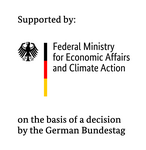Persim
Perception for resource identification and long-term environment representation with simulating capability

Technologies for identifying space resources will play a very important role in the next lunar and Mars missions, in this context the capabilities of space robots can become crucial. On the moon, where manned missions will soon take place again, water, gases, metals and other valuable resources can be found. Resource characterisation is an essential prerequisite for high-performance in-situ resource utilisation (ISRU), such as the use or processing of deposits for construction and propellants as well as other materials needed to secure and extend the mission. Another advantage of resource characterisation technology development comes from the greater science gain in exploration missions. The aim is to develop integrable software modules that create a virtual and highly realistic representation of the environment on the basis of data from representative sensors. Among other things, these sensors should record the mineralogical composition of materials (stones, regolith, water or ice) in the direct vicinity of the robot and thus provide a valuable supplement to the environment representation. With the help of the environment representation, potential guidelines for autonomous navigation will be passed on to the navigation software on the one hand, and on the other hand will be stored in a virtual memory for recurring situations.
| Duration: | 01.07.2022 till 31.12.2024 |
| Donee: | German Research Center for Artificial Intelligence GmbH |
| Sponsor: |
Federal Ministry for Economic Affairs and Climate Action
German Aerospace Center e.V. |
| Grant number: | 50RA2124 |
| Application Field: | Space Robotics |
| Related Robots: |
ASGUARD IV
Advanced Security Guard V4
Coyote II
High Mobile Micro Rover
|
Project details
In this project, innovative system-independent software components are to be developed, which will lead to an increase in the degree of autonomy in future unmanned or armed space missions, as well as to a higher reliability of navigation capabilities in the use of robotic systems.
The aim is to develop integrable software modules that create a virtual and highly realistic representation of the environment on the basis of data from representative sensors. Among other things, these sensors should record the mineralogical composition of materials (stones, regolith, water or ice) in the direct vicinity of the robot and thus provide a valuable supplement to the environment representation. With the help of the environment representation, potential guidelines for autonomous navigation will be passed on to the navigation software on the one hand, and on the other hand will be stored in a virtual memory for recurring situations. In this way, the experiences of long periods of use can be integrated into the system control in a sustainable way in order to learn more efficient and safer strategies for the future.
The development and demonstration of the integrable software components will be carried out on a rover with a gripper arm available at the DFKI. Coyote III, the robotic system to be used, was developed in the TransTerrA project (FKZ 50RA1301) for testing space technology in an environment representative of lunar or Martian surfaces.
The project builds on the latest innovations from DFKI's research projects and pursues the development of two key technologies: Space Resource Identification and Internal Simulations. These two technologies can be used very efficiently to create a system with unprecedented autonomous perception features and capabilities to identify and avoid dangerous situations. The development of an internal simulation will also lead to progress in the exploration of robotics reinforcement learning applications. Corresponding functions have already been identified in the literature on a theoretical level with regard to efficient use. However, the environment representation technology required for this is currently not implemented robustly enough to develop real-world applications that would benefit from such technology.
Furthermore, the project has a strong focus on reproducibility. Through a test-driven approach embedded in an agile development methodology, robust and comprehensive tests will be conducted offline (through simulation and through data set playback) and online (through field testing). The tests and the corresponding results are stored in connection with the data sets and the definition of different missions in a database, which also serves for the continuous verification of the functions.
The concept of the Digital Twin, from Industry 4.0, is a central theme that is applied to a space scenario in this project. In particular, two aspects of the Digital Twin will be developed:
1) The capabilities of robotic systems to digitise the state of the environment will be extended and
2) monitoring and improving long-term system performance based on realistic data-driven simulations and learning approaches using the collected data from sensors and software components.
Videos
Persim: Autonomous navigation on steep slope of a crater

The autonomous navigation of Coyote 3 is presented while a steep slope is traversed. The map below on the right shows the traversable areas as green, and the obstacles in red. The planned path to be followed is also displayed in the visualization.
Field tests during the Persim project at the Vulcano Summer School 2023

Asguard v4 during the Vulcano Summer School of 2023. The rover was involved in various autonomous navigation tests and data collection activities.



